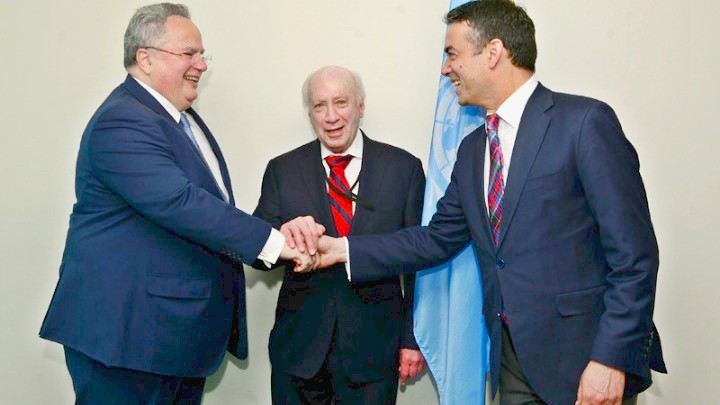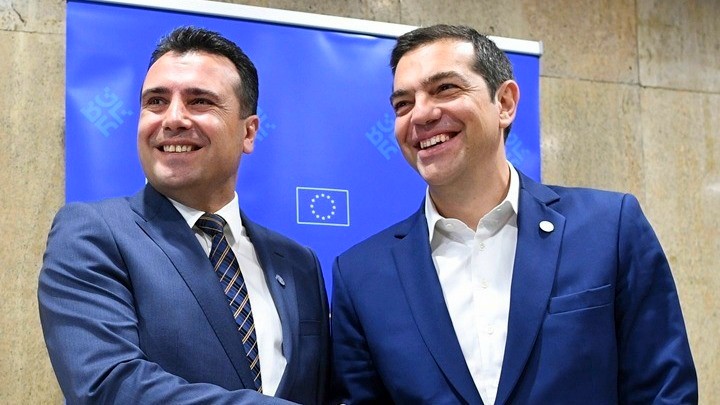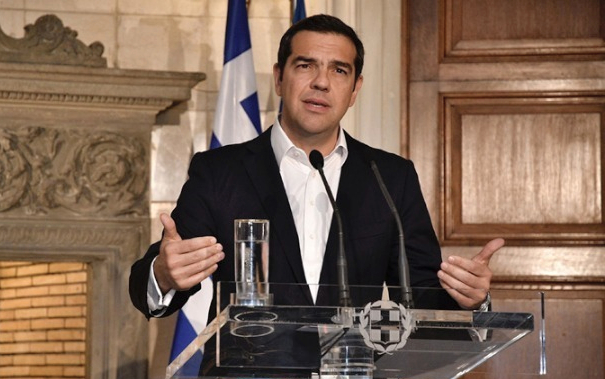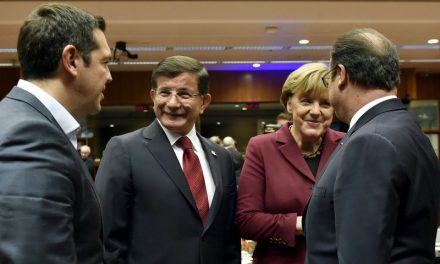Greek Prime Minister Alexis Tsipras said on Tuesday (June 12) that FYROM has agreed to be called Severna Makedonija (“Republic of North Macedonia”) as part of an agreement to settle the name dispute between the two nations. The agreement, which will put an end to a twenty-seven-year dispute, will be signed by the foreign ministers of both countries and will then go to FYROM’s parliament for approval, he noted in a televised address.
“I am deeply convinced that this agreement will be a diplomatic victory and also a large historic opportunity,” Tsipras said. “If FYROM does not make the necessary changes to its constitution, as foreseen by the deal, then this will cancel the invitation to join the NATO military alliance and start induction talks with the European Union”, he added.
At a meeting with the president of the Hellenic Republic Prokopios Pavlopoulos, Tsipras said that “we have a good agreement that covers all of the conditions put forth by the Greek side. We have a combined name with a geographic qualifier for all uses”. He added that the deal includes changes that go beyond the name, eliminating the issue of irredentism, and that the most important part of the agreement is that the cultural heritage of Ancient Greek Macedonia is being safeguarded.
As PM Tsipras stated, the Greek side will ratify the agreement once FYROM makes the necessary changes to its constitution. President Pavlopoulos said that it is now FYROM’s responsibility to observe the terms of the deal. “It is clear that the responsibility for implementing the agreed-upon terms rests entirely with our neighbouring country” Pavlopoulos told Tsipras.
Greek main opposition reaction: “It’s a bad deal”
Commenting on the deal, New Democracy leader Kyriakos Mitsotakis noted on the same day that the agreement reached by Prime Minister Alexis Tsipras and his FYROM counterpart on the name issue is a “bad deal”. “I want to be absolutely clear. Tsipras does not have the political legitimacy to bind this country by signing an agreement that does not have the support of his own government,” he said.
“The solution agreed upon is a bad deal. It goes against what the majority of Greeks want. Some people do not understand this, or even worse, they do not want to understand it,” he added. The ND leader also met with President Prokopios Pavlopoulos (Wednesday 13 June) laying out his position on the recent agreement.
Zaev and the opposition
At a press conference following his communication with the Greek PM, the PM of FYROM, Zoran Zaev, said that FYROM’S bid in the compromise is a defined and precise name, a name that is honourable and geographically precise – “Republic of Northern Macedonia”, adding that “by solving the name issue, we are becoming a member of NATO”.
“Today is a tough day for the Republic of Macedonia. We just watched a press conference where defeat is shown as a fake victory,” was the reaction of Hristijan Mickoski, leader of opposition party VMRO-DPMNE.

Greek Minister of Foreign Affairs Nikos Kotzias with his FYROM peer Nikola Dimitrov and UN special Envoy Matthew Nimetz
International community reactions
UN Special Envoy on the name issue Matthew Nimetz warmly welcomed the agreement between Greece and FYROM on Tuesday, and called the decision “a mutually beneficial solution for the broader region.”
“Above all, I want to congratulate and commend the two Ministers of Foreign Affairs, Ministers (Nikola) Dimitrov and (Nikos) Kotzias, who have demonstrated leadership, vision and determination in the negotiating process and never faltered in their efforts to reach a mutually beneficial solution for their own nation but also for the broader region,” he concluded.
President of the European Council Donald Tusk congratulated the prime ministers of Greece and FYROM over their agreement on the name issue on Tuesday, stressing in a tweet that thanks to the two Heads of State “the impossible is becoming possible”.
High Representativeof the EU for Foreign Affairs & Security Policy/Vice-President of the Cimmission Federica Mogherini and Commissioner Johannes Hahn congratulated Prime Ministers Alexis Tsipras and Zoran Zaev for reaching agreement, noting that this “contributes to the transformation of the entire region of South-East Europe.” The agreement, they said, provides a “window of opportunity that has been pushed wide open to accompany and consolidate the winds of peace and cooperation in the entire region.” NATO Secretary General Jens Stoltenberg also welcomed the agreement between Athens and Skopje on the name issue, and said it “will set Skopje on its path to NATO membership and it will help to consolidate peace and stability across the wider Western Balkans

Alexander hunting a lion with his friend Craterus; late 4th-centuryBC mosaic Pella Museum
What is the name issue, the key dates and the Greek position?
Historically, the term “Macedonia”, which is a Greek word, refers to the Kingdom and culture of the ancient Macedonians, who belong to the Hellenic nation and are unquestionably part of Greek historical and cultural heritage.
Geographically, the term “Macedonia” refers to a wider region extending into the current territory of various Balkan countries, with the largest part of the region being in Greece and smaller sections in the Former Yugoslav Republic of Macedonia, Bulgaria and Albania. The core of what was ancient Macedonia lies within contemporary Greek borders, comprises the northern portion of the Greek state, and is called Macedonia. Some 2.5 million Greeks reside in this region today and they and their forebears have considered and called themselves Macedonians through the centuries.
The roots of the name issue go back to the mid-1940s, when, in the aftermath of the Second World War, Yugoslav Commander in Chief Tito separated from Serbia the region that had been known until that time as Vardar Banovina (today’s Former Yugoslav Republic of Macedonia), giving it the status of a federal unit of the new Socialist Federal Republic, renaming it, initially, the “People’s Republic of Macedonia”, and, later, the “Socialist Republic of Macedonia”. At the same time, he started to cultivate the idea of a separate and discrete “Macedonian nation”.
Tito of course had many reasons for making these moves, the main one being to lay the foundations for future Yugoslavian territorial claims in the wider region of Macedonia and secure an opening on the Aegean. Tito’s intentions in the wider Macedonian region had been confirmed as early as 1944, when he declared publicly that his goal was to reunify “all the sections of Macedonia that were broken up in 1912 and 1913 by the Balkan imperialists.”
The issue of the name of the Former Yugoslav Republic of Macedonia arose in 1991, when the Former Yugoslav Republic of Macedonia seceded from Yugoslavia and declared its independence under the name “Republic of Macedonia”.
Greece reacted strongly to the appropriation of its historical and cultural heritage and the territorial and irredentist intentions of the Former Yugoslav Republic of Macedonia, and the issue came before the UN Security Council, which, in two resolutions [817(1993) and 845(1993)] recommended that a settlement be found quickly, for the sake of peaceful relations and good neighbourliness in the region.
In 1993, following a recommendation from the Security Council, the Former Yugoslav Republic of Macedonia was accepted, by decision of the General Assembly, into the United Nations under this provisional name, until such time as an agreed solution would be reached. In 1995, Greece and FYROM concluded an Interim Accord, which imposed a binding “code of conduct”. Based on the Interim Accord, the two sides began negotiations under the auspices of the UN. These negotiations have continued to this day.
At the Bucharest NATO Summit of April 2008, the members of the Alliance decided in a collective and unanimous decision that an accession invitation would be extended to the Former Yugoslav Republic of Macedonia only if the name issue has been resolved in a mutually acceptable manner. This decision has been reaffirmed and reiterated at all subsequent NATO Summits, including those in Strasbourg (2009), Lisbon (2010), and Chicago (2012).

Greek PM Alexis Tsipras at a meeting with FYROM PM, Zoran Zaev
On 17 November 2008, the Former Yugoslav Republic of Macedonia referred Greece to the International Court of Justice (ICJ) in The Hague, alleging that Greece raised objections to the Former Yugoslav Republic of Macedonia’s accession to NATO at the Bucharest Summit in 2008.
At the June 2008 European Council the EU decided, in a collective and unanimous decision, that the resolution of the name issue in a mutually acceptable manner is a fundamental necessity, if further steps are to be taken on the Former Yugoslav Republic of Macedonia’s EU accession course.
In October 2012, the Greek government took a major initiative aimed at imparting momentum to the negotiation process for the resolution of the name issue. The Greek Foreign Minister sent a letter to his Former Yugoslav Republic of Macedonia counterpart, proposing that the two countries sign a Memorandum of Understanding that would set out the framework and basic parameters for the definitive resolution of the name issue. Specifically, this letter proposed that in order to provide a fresh impetus to the substance of the negotiations under the auspices of the UN Secretary-General, it was necessary to proceed on the basis of an agreed framework on the basic parameters of a solution which should include an agreement on the fact that any proposal should contain a clear and definitive qualifier regarding the name, which will leave no ambiguities as to the distinction between the territory of the former Yugoslav Republic of Macedonia and regions in neighbouring countries, in particular, the region of Macedonia in northern Greece, and that the name agreed upon would be used by all (erga omnes) and for all purposes. The international response to this proposal was positive. In its response, the Former Yugoslav Republic of Macedonia, while thanking the Greek side for its proposal, reiterated its longstanding positions, essentially dismissing the Greek proposal.
In December 2012, the European Council decided, in a collective and unanimous decision, that the opening of EU accession negotiations with the Former Yugoslav Republic of Macedonia hinges on the implementation of necessary reforms, the promotion of and respect for good neighbourly relations, and the resolution of the name issue within the framework of the negotiations under the UN.
Greece supports rather than opposes the Former Yugoslav Republic of Macedonia’s European and Euroatlantic perspective. It was also with Greece’s consent that the visa requirement for citizens of the Former Yugoslav Republic of Macedonia was abolished. But the basic objective prerequisite for the continuation and completion of the European and Euroatlantic courses of every candidate country is adoption of and respect in practice for the fundamental principles of the organisation they want to join, and particularly the principle of good neighbourly relations, which is the basis for a partnership or alliance between states.
The resolution of the name issue will remove a major point of friction from the relations between the two countries and will allow for full realisation of the great potential for cooperation between the two countries.
F.K.
(Sources: Greek Ministry of Foreign Affairs: FYROM name issue, ANA-MPA Photographs: ANA-MPA)














